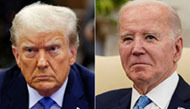▶ PAUL KRUGMAN
And I do mean fantasies. Washington has spent the past three-plus years in terror of a debt crisis that keeps not happening, and, in fact, can’t happen to a country like the United States, which has its own currency and borrows in that currency. Yet the scaremongers can’t bring themselves to let go.
Consider, for example, Stanley Druckenmiller, the billionaire investor, who has lately made a splash with warnings about the burden of our entitlement programs. (Gee, why hasn’t anyone else thought of making that point?) He could talk about the problems we may face a decade or two down the road. But, no. He seems to feel that he must warn about the looming threat of a financial crisis worse than 2008.
Or consider the deficit-scold organization Fix the Debt, led by the omnipresent Alan Simpson and Erskine Bowles. It was, I suppose, predictable that Fix the Debt would respond to the latest budget deal with a press release trying to shift the focus to its favorite subject. But the organization wasn’t content with declaring that America’s long-run budget issues remain unresolved, which is true. It had to warn that “continuing to delay confronting our debt is letting a fire burn that could get out of control at any moment.”
As I’ve already suggested, there are two remarkable things about this kind of doomsaying. One is that the doomsayers haven’t rethought their premises despite being wrong again and again — perhaps because the news media continue to treat them with immense respect. The other is that as far as I can tell nobody, and I mean nobody, in the looming-apocalypse camp has tried to explain exactly how the predicted disaster would actually work.
On the Chicken Little aspect: It’s actually awesome, in a way, to realize how long cries of looming disaster have filled our airwaves and op-ed pages. For example, I just reread an op-ed article by Alan Greenspan in The Wall Street Journal, warning that our budget deficit will lead to soaring inflation and interest rates. What about the reality of low inflation and low rates? That, he declares in the article, is “regrettable, because it is fostering a sense of complacency.”
It’s curious how readily people who normally revere the wisdom of markets declare the markets all wrong when they fail to panic the way they’re supposed to. But the really striking thing at this point is the date: Mr. Greenspan’s article was published in June 2010, almost three and a half years ago — and both inflation and interest rates remain low.
So has the ex-Maestro reconsidered his views after having been so wrong for so long? Not a bit. His new (and pretty bad) book declares that “the bias toward unconstrained deficit spending is our top domestic economic problem.”
Meanwhile, about that oft-prophesied, never-arriving debt crisis: In Senate testimony more than two and half years ago, Mr. Bowles warned that we were likely to face a fiscal crisis within around two years, and he urged his listeners to “just stop for a minute and think about what happens” if “our bankers in Asia” stop buying our debt. But has he, or anyone in his camp, actually tried to think through what would happen? No, not really. They just assume that it would cause soaring interest rates and economic collapse, when both theory and evidence suggest otherwise.
Don’t believe me? Look at Japan, a country that, like America, has its own currency and borrows in that currency, and has much higher debt relative to G.D.P. than we do. Since taking office, Prime Minister Shinzo Abe has, in effect, engineered exactly the kind of loss of confidence the debt worriers fear — that is, he has persuaded investors that deflation is over and inflation lies ahead, which reduces the attractiveness of Japanese bonds. And the effects on the Japanese economy have been entirely positive! Interest rates are still low, because people expect the Bank of Japan (the equivalent of our Federal Reserve) to keep them low; the yen has fallen, which is a good thing, because it make Japanese exports more competitive. And Japanese economic growth has actually accelerated.
Why, then, should we fear a debt apocalypse here? Surely, you may think, someone in the debt-apocalypse community has offered a clear explanation. But nobody has.
So the next time you see some serious-looking man in a suit declaring that we’re teetering on the precipice of fiscal doom, don’t be afraid. He and his friends have been wrong about everything so far, and they literally have no idea what they’re talking about.
스마터리빙
more [ 건강]
[ 건강]이제 혈관 건강도 챙기자!
[현대해운]우리 눈에 보이지 않기 때문에 혈관 건강을 챙기는 것은 결코 쉽지 않은데요. 여러분은 혈관 건강을 유지하기 위해 어떤 노력을 하시나요?
 [ 건강]
[ 건강]내 몸이 건강해지는 과일궁합
 [ 라이프]
[ 라이프]벌레야 물럿거라! 천연 해충제 만들기
 [ 건강]
[ 건강]혈압 낮추는데 좋은 식품
[현대해운]혈관 건강은 주로 노화가 진행되면서 지켜야 할 문제라고 인식되어 왔습니다. 최근 생활 패턴과 식생활의 변화로 혈관의 노화 진행이 빨라지고
사람·사람들
more많이 본 기사
- 제트블루 여객기, 카리브해 상공서 미군 급유기와 충돌 위기
- 李대통령, 오늘 라오스 주석과 정상회담…초국가범죄 대응 논의
- ‘통일교 1억 수수’ 권성동 국민의힘 의원, 법원에 보석 청구
- 검찰, ‘254억 횡령’ 유병언 차남 유혁기에 징역 8년 구형
- 시드니 유대인 총기참사 용의자는 50세 아버지·24세 아들
- 호주 총격범 제압 시민 영웅은 43세 과일가게 주인 아흐메드 씨
- 경찰, 통일교·전재수 사무실 등 압수수색…첫 강제수사
- 美장성의 소신발언… “대통령 명령이라도 합법여부 따져볼것”
- 故 김지미에 금관문화훈장…마지막 말은 “보고싶다 사랑한다”
- 李대통령 “’4·3 강경진압’ 박진경 유공자 등록 취소 검토하라”
- 시드니 해변 총격 사망자 16명으로 늘어…1명은 어린이
- 계엄 동기·김건희 역할 밝힐까…내란특검, 오늘 수사결과 발표
- 1년→6개월→0일… “오픈AI, 입사 첫날부터 스톡옵션 부여”
- [특파원시선] 외식비 줄이는 미국… ‘30% 요구’ 팁 공포도 한몫?
- 트럼프 특사 “우크라와 5시간 회담서 많은 진전…15일 재개”
- 시리아 “미군 살해범, IS 연루 의혹에 해고 직전 범행”
- 트럼프, 시리아內 미군공격에 연일 보복 거론… “큰 피해 있을것”
- ‘이럴수가’ 송성문 ‘120억 초대박 계약’ 무효 가능성 현실화, 美 현지 소식 나왔다 “MLB서 최소 5개 구단 관심”
- 시드니 해변 총격 사망자 16명으로 늘어…1명은 어린이
- ‘손흥민 벽화 3일 만에 그린’ 예술가, SON과 감격 만남 후 “내 아들의 영웅이자 아시아 유산” 찬사
- 김지수, 꿀꿀했던 韓 떠났다.. “에펠탑 보니 메마른 낭만 살아나”
- “트럼프, 바이든 데자뷔인줄” 취임 1년새 고령 논란·지지율 뚝
- ‘김민재 점점 독일 국대에 밀린다’ 독일 현지, 타 향해 연일 찬사... “뮌헨 최고의 영입, 진정한 수비 리더”
- 젤렌스키 “나토 가입 대신 서방 집단방위 보장으로 타협”
- “머스크처럼…” 미국인 대리모 통해 2세 퍼트리는 中재벌
- 변요한♥티파니, 약지에 ‘커플링·포르쉐’..열애 中 티냈다
- ‘연준의장 후보’ 해싯 “대통령 목소리는 의견일뿐…FOMC가 투표”
- 바비킴, 15년 만에 ‘기내 난동 논란’ 재언급.. “공격적 태도 사과하고파”
- 성탄절 초록잎 아래 5초간 1천435쌍 입맞춤…워싱턴 기네스기록
- ‘53세’ 김민종 “2년 안에 결혼한다” 폭탄 발언..일·사랑 모두 잡을까
- 윤영호, ‘플리바게닝’ 노렸나…자충수 된 ‘민주당 금품’ 진술
- “사초 쓰겠다”던 내란특검 ‘180일 대장정’ 마침표…24명 재판에
- 뉴욕 백화점서 아기 기저귀 갈던 엄마, 정신질환자에 흉기피습
- ‘단 4개월 만에’ 손흥민 美 정복, MLS 공식 ‘올해의 영입 2위’... “리그 판도 뒤바꿔”
- 내년 중간선거 낙관못하는 트럼프… “경제성과 전달에 시간 걸려”
- 아이비리그 브라운대서 총격…최소 2명 사망, 8명 중상
- ‘아프리카에 당한 기억’ 홍명보, ‘1승 제물’ 남아공 경계했다... 박문성도 “2014 월드컵 악몽 떠올라”
- BTS 정국·에스파 윈터, 열애설에 침묵 후 근황..논란 언급 없이 팬들과 소통
- 주말 濠·美서 총기사건…시드니 11명·브라운대 2명 사망
- 도쿄행 유나이티드 항공편, 엔진 고장에 워싱턴으로 회항
- 정용진 신세계그룹 회장, 밴스 부통령 성탄절 만찬 참석
- 조미김, 미국 수출관세 ‘면제’됐다…K-김 최대시장서 날개
- ‘인니 수마트라섬 대홍수’ 사망자 1천명 넘어…218명 실종
- ‘무려 키패스 3회+평점 8.2’ 이강인 특급 맹활약, 5호 공격P 작렬... ‘간신히’ PSG 선두 탈환
- 인도 투어 나선 축구스타 메시…경기장 조기 퇴장에 팬들 난동
- 지선 손 맞잡을까…통일교 특검으로 거리 좁히는 국힘·개혁신당
- 내년 중간선거 낙관못하는 트럼프… “경제성과 전달에 시간 걸려”
- 경찰직무집행법 통과로 1차 필버 종료…연말 ‘필버 재격돌’ 전망
- 오세훈 “내집 마련 꿈, 10·15대책에 짓밟혀…규제 완화해야”
- 1124일만 선고.. ‘20억 횡령 인정’ 박수홍 친형 결론은?
1/5지식톡

-
 테슬라 자동차 시트커버 장착
0
테슬라 자동차 시트커버 장착
0테슬라 시트커버, 사놓고 아직 못 씌우셨죠?장착이 생각보다 쉽지 않습니다.20년 경력 전문가에게 맡기세요 — 깔끔하고 딱 맞게 장착해드립니다!장착비용:앞좌석: $40뒷좌석: $60앞·뒷좌석 …
-
 식당용 부탄가스
0
식당용 부탄가스
0식당용 부탄가스 홀세일 합니다 로스앤젤레스 다운타운 픽업 가능 안녕 하세요?강아지 & 고양이 모든 애완동물 / 반려동물 식품 & 모든 애완동물/반려동물 관련 제품들 전문적으로 홀세일/취급하는 회사 입니다 100% …
-
 ACSL 국제 컴퓨터 과학 대회, …
0
ACSL 국제 컴퓨터 과학 대회, …
0웹사이트 : www.eduspot.co.kr 카카오톡 상담하기 : https://pf.kakao.com/_BEQWxb블로그 : https://blog.naver.com/eduspotmain안녕하세요, 에듀스팟입니다…
-
 바디프렌드 안마의자 창고 리퍼브 세…
0
바디프렌드 안마의자 창고 리퍼브 세…
0거의 새제품급 리퍼브 안마의자 대방출 한다고 합니다!8월 23일(토)…24일(일) 단 이틀!특가 판매가Famille: $500 ~ $1,000Falcon: $1,500 ~ $2,500픽업 & 배송직접 픽업 가능LA…
-
 바디프렌드 안마의자 창고 리퍼브 세…
0
바디프렌드 안마의자 창고 리퍼브 세…
0거의 새제품급 리퍼브 안마의자 대방출 한다고 합니다!8월 23일(토)…24일(일) 단 이틀!특가 판매가Famille: $500 ~ $1,000Falcon: $1,500 ~ $2,500픽업 & 배송직접 픽업 가능LA…
케이타운 1번가
오늘의 1면
오피니언

22기 LA평통 출범에 거는 기대

연말 시즌 사기·범죄 경계해야
 메건 매카들 워싱턴포스트 칼럼니스트
메건 매카들 워싱턴포스트 칼럼니스트 [메건 매카들 칼럼] 장편영화의 마지막 챕터인가
 김미선 서북미문인협회 회장시인
김미선 서북미문인협회 회장시인 [한국춘추] 하늘을 계산한 사람들, 칠정산
 이희숙 시인·수필가
이희숙 시인·수필가 [금요단상] 그을린 자리에서 다시
 심상용 / 서울대 미술관장
심상용 / 서울대 미술관장 [미술 다시보기] 지옥에 대하여
 서정명 / 서울경제 기자
서정명 / 서울경제 기자[만화경] 주한미군과 ‘도련선 리스크’
 한 영 재미수필가협회 회장
한 영 재미수필가협회 회장 [한영의 독서칼럼] 불안한 사람들
 정영현 서울경제 테크성장부장
정영현 서울경제 테크성장부장 [여명] 콘크리트가 데이터가 됐을 뿐, 달라진 게 없다
1/3지사별 뉴스

“마약밀매·인신매매 등 국제범죄 척결” ‘국토안보 태스크포스’ 뉴욕지부 출범
연방 국토안보부가 10일 ‘국토안보 태스크포스’(HSTF) 뉴욕지부를 출범시켰다.HSTF는 마약 카르텔, 인신매매, 자금세탁, 갱단 등 국제범…
‘오바마케어 보조금’ 올해 말 종료 가능성 ↑ 커져

한국 교사 10명, 페어팩스 초등교 배치
‘글로벌 앰버서더 티처스 프로그램’(Global Ambassador Teachers Program)은 국제 교사 교환 프로그램 가운데 하나로 …
김찬수씨, 포토맥 포럼에 2천달러 기부

시드니 해변 총격 사망자 16명으로 늘어…1명은 어린이
호주 시드니 해변 유대인 행사장의 총기 난사 사건 사망자가 어린이 1명을 포함해 16명으로 늘었다.라이언 파크 뉴사우스웨일즈(NWS)주 보건부…
내년 중간선거 낙관못하는 트럼프… “경제성과 전달에 시간 걸려”

오늘 하루 이 창 열지 않음 닫기 





















































.png)


댓글 안에 당신의 성숙함도 담아 주세요.
'오늘의 한마디'는 기사에 대하여 자신의 생각을 말하고 남의 생각을 들으며 서로 다양한 의견을 나누는 공간입니다. 그러나 간혹 불건전한 내용을 올리시는 분들이 계셔서 건전한 인터넷문화 정착을 위해 아래와 같은 운영원칙을 적용합니다.
자체 모니터링을 통해 아래에 해당하는 내용이 포함된 댓글이 발견되면 예고없이 삭제 조치를 하겠습니다.
불건전한 댓글을 올리거나, 이름에 비속어 및 상대방의 불쾌감을 주는 단어를 사용, 유명인 또는 특정 일반인을 사칭하는 경우 이용에 대한 차단 제재를 받을 수 있습니다. 차단될 경우, 일주일간 댓글을 달수 없게 됩니다.
명예훼손, 개인정보 유출, 욕설 등 법률에 위반되는 댓글은 관계 법령에 의거 민형사상 처벌을 받을 수 있으니 이용에 주의를 부탁드립니다.
Close
x